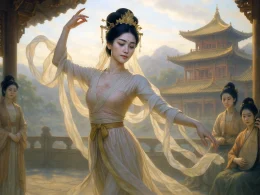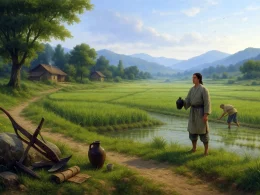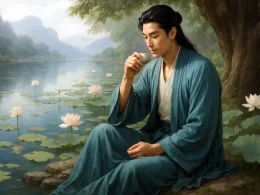The sunlit CenserPeak exhales incense-like cloud;
Like anupended stream the cataract sounds loud.
Its torrentdashes down three thousand feet from high,
As if theSilver River fell from the blue sky.
Original Poem
「望庐山瀑布」
李白
日照香炉生紫烟,遥看瀑布挂前川。
飞流直下三千尺,疑是银河落九天。
Interpretation
Composed during Li Bai's travels to Mount Lu, this poem stands among his most celebrated landscape works. Confronting the natural wonder of Incense Burner Peak waterfall, Li Bai not only captures its physical form but, through imaginative genius, transforms its essence—elevating a terrestrial waterfall into a cosmic spectacle connecting heaven and earth, immortal and mortal realms. This work represents the ultimate fusion of High Tang grandeur and romantic spirit.
First Couplet: "日照香炉生紫烟,遥看瀑布挂前川。"
Rì zhào xiānglú shēng zǐ yān, yáo kàn pùbù guà qián chuān.
Sunlit Incense Burner exhales purple mist; Afar, the waterfall hangs like a river's sash.
The opening couplet begins with magnificent color and precise perspective. "Exhales purple mist" is inspired—depicting mountain haze's refractive phenomenon as both physically accurate (light dispersion through water droplets) and mystically enchanting, creating a magical backdrop for the waterfall's appearance. "Hangs" is the poetic eye, transforming dynamic flow into static suspension, freezing the torrent into a monumental landscape painting, capturing the poet's distant initial impression and formal beauty.
Second Couplet: "飞流直下三千尺,疑是银河落九天。"
Fēi liú zhí xià sānqiān chǐ, yí shì yínhé luò jiǔtiān.
Cascading straight down three thousand feet; Is this the Milky Way falling from heaven's peak?
This couplet achieves emotional eruption and imaginative leap. "Cascading straight down" contrasts sharply with the prior static "hangs," activating the scene into dynamic impact. "Three thousand feet" exaggerates not for measurement but to challenge visual and psychological limits with numerical extremity. Finally, "Milky Way falling from heaven" completes the ultimate leap from reality to fantasy—more than mere metaphor, it creates a new cosmic vision where the waterfall becomes celestial river pouring from the firmament, drawing readers' thoughts into infinite cosmic depths.
Holistic Appreciation
The poem's artistic achievement lies in constructing a complete visual pathway from human world to celestial realm. The poet's gaze moves upward (viewing the mist-shrouded peak) then downward (seeing the hanging waterfall, suspecting the falling galaxy), completing a perfect spatial cycle. Here, natural scenery is utterly poeticized and deified. Through his expansive spirit and transcendent imagination, Li Bai elevates a waterfall into a cultural symbol embodying the High Tang literati's courage to imagine, exaggerate, and equate personal emotion with cosmic scale. Countless later writers facing waterfalls found it difficult to surpass this aesthetic milestone Li Bai established.
Artistic Merits
- Fantasy Through Reality-Illusion Blending: Skillfully interweaving real "purple mist" and "waterfall" with virtual "three thousand feet," "Milky Way," and "ninth heaven" creates a magical world both real and transcendent.
- Strategic Perspective and Motion Transition: Shifting from distant static view ("hangs") to proximate dynamic sensation ("cascading down") brings layered, deepening perception through perspective movement.
- Ultimate Exaggeration and Metaphor: "Three thousand feet" represents quantitative extreme exaggeration; "Milky Way falling from heaven" qualitative ultimate metaphor—combined, they generate nuclear-fusion-like artistic impact.
- Perfect Fusion of Color and Momentum: The gorgeous "purple mist" and majestic "Milky Way" jointly compose a visual symphony both colorfully brilliant and grandly imposing.
Insights
This poem gifts us courage and capability to reconstruct our worldview. It teaches that true poetry stems not from meticulous reality copying but from empowering the heart to reshape reality, granting it meaning and radiance beyond itself. In Li Bai's eyes, a waterfall could become the Milky Way's embodiment; similarly, in our lives, might common clouds or casual breezes be interpreted into personal "mythologies"? In our increasingly techno-rational era, this poem reminds us that nurturing the wonder and imagination behind "Is this the Milky Way falling from heaven?" may be vital for resisting life's flattening and maintaining spiritual vitality. True magnificence resides both in famous landscapes and, more importantly, in the heart that discovers and creates it.
Poem translator
Xu Yuanchong(许渊冲)
About the poet

Li Bai (李白), 701 - 762 A.D., whose ancestral home was in Gansu, was preceded by Li Guang, a general of the Han Dynasty. Tang poetry is one of the brightest constellations in the history of Chinese literature, and one of the brightest stars is Li Bai.












